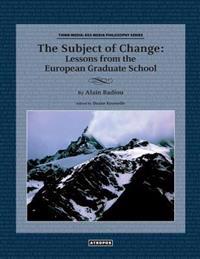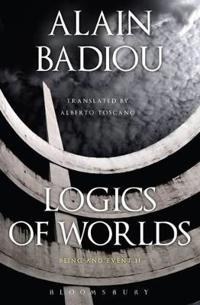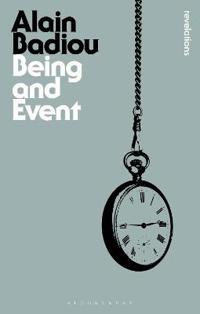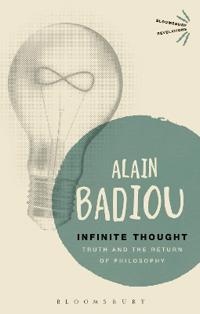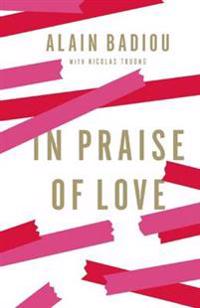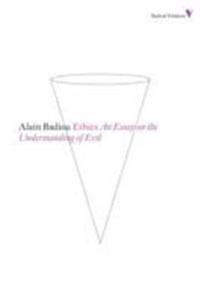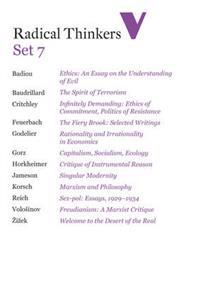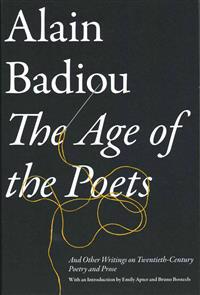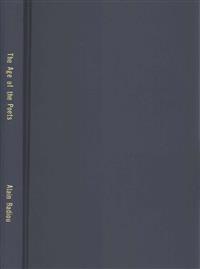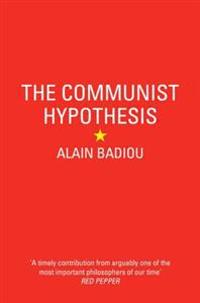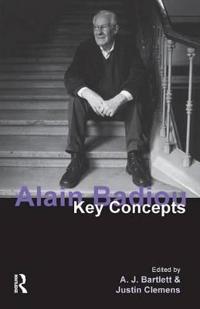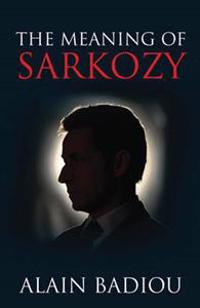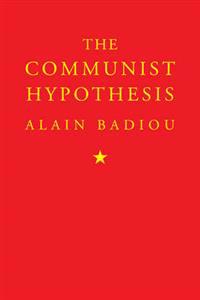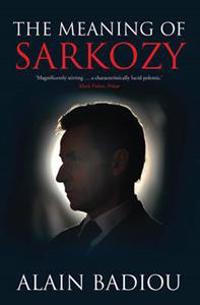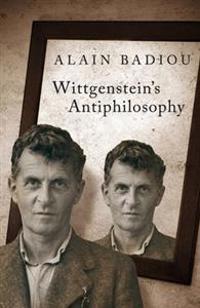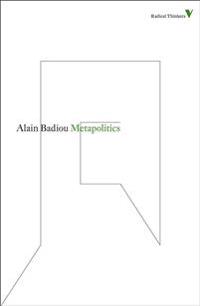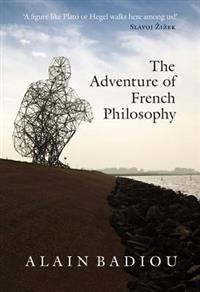The Subject of Change: Lessons from the European Graduate School (Häftad)
avAlain Badiou, Duane Rousselle
ISBN: 9780988517028 - UTGIVEN: 201302Theory of the Subject (Pocket)
avAlain Badiou
ISBN: 9781441159595 - UTGIVEN: 2013-04-11Available in English and in paperback for the first time, this is one of the most important and influential works by Badiou, one of France's most important and exciting contemporary thinkers. The translator is Bruno Bosteels, who also contributes a full critical introduction.[...]
Logics of Worlds (Häftad)
avAlain Badiou
ISBN: 9781441172969 - UTGIVEN: 201302Logics of Worlds is the sequel to Alain Badiou's much-heralded masterpiece, Being and Event. Tackling the questions that had been left open by Being and Event, and answering many of his critics in the process, Badiou supplements his pioneering treatment of multiple being with a daring and complex th[...]
Thinking Education Through Alain Badiou (Häftad)
avEditor: Kent Den Heyer
ISBN: 9781444337426 - UTGIVEN: 2010-09-30Being and Event (Häftad)
avAlain Badiou
ISBN: 9781472511065 - UTGIVEN: 2013-10Since the book's first publication in 1988, Alain Badiou's Being and Event has established itself of one of the most important and controversial works in contemporary philosophy and its author as one of the most influential thinkers of our time. Being and Event is a comprehensive statement of Badiou[...]
Infinite Thought (Häftad)
avAlain Badiou
ISBN: 9781472572738 - UTGIVEN: 2014-10Alain Badiou (1937- ) is one of the most high profile and controversial philosophers writing in France today. A leading light in the generation of thinkers who come of intellectual age in 1968, his work deftly draws on a wide range of intellectual traditions and thinkers from Plato and Lucretius, th[...]
Ethics (Häftad)
avAlain Badiou
ISBN: 9781781680186 - UTGIVEN: 201301Alain Badiou, one of the most powerful voices in contemporary French philosophy, shows how our prevailing ethical principles serve ultimately to reinforce an ideology of the status quo and fail to provide a framework for an effective understanding of the concept of evil.[...]
Radical Thinkers Set 7 (Häftad)
avAlain Badiou, Jean Baudrillard, Slavoj Zizek
ISBN: 9781781680605 - UTGIVEN: 201301Singular Modernity, Jameson Ethics, Badiou The Spirit of Terrorism, Baudrillard Infinitely Demanding, Critchley The Fiery Brook, Feuerbach Rationality and Irrationality in Economics, Godelier Capitalism, Socialism, Ecology, Gorz Critique of Instrumental Reason, Horkheimer Marxism and Philoso[...]
Rhapsody for the Theatre (Häftad)
avAlain Badiou
ISBN: 9781781681251 - UTGIVEN: 2013-09For Alain Badiou, theatre--unlike cinema--is the place for the staging of a truly emancipatory collective subject. In this sense theatre is, of all the arts, the one strictly homologous to politics: both theatre and politics depend on a limited set of texts or statements, collectively enacted by a g[...]
The Age of the Poets (Pocket)
avAlain Badiou, Bruno (EDT) Bosteels, Emily (INT) Apter
ISBN: 9781781685693 - UTGIVEN: 2014-11In this collection of essays, Alain Badiou revisits the age-old problem of the relation between literature and philosophy, arguing against both Plato and Heidegger's famous arguments. Philosophy neither has to ban the poets from the republic nor abdicate its own powers to the sole benefit of poetry [...]
The Age of the Poets: And Other Writings on Twentieth-Century Poetry and Prose (Inbunden)
avAlain Badiou
ISBN: 9781781685709 - UTGIVEN: 2014-11In this collection of essays, Alain Badiou revisits the age-old problem of the relation between literature and philosophy, arguing against both Plato and Heidegger's famous arguments. Philosophy neither has to ban the poets from the republic nor abdicate its own powers to the sole benefit of poetry [...]
Philosophy for Militants (Häftad)
avAlain Badiou
ISBN: 9781781688694 - UTGIVEN: 2015-04This concise, accessible volume captures the relationship between politics and philosophy as it is conceived in Alain Badiou's work. Harking back to his mentor Louis Althusser, Badiou explains how politics conditions philosophy, while suggesting that philosophy itself may be needed to clarify the tr[...]
The Communist Hypothesis (Pocket)
avAlain Badiou, David (TRN) Macey, Steve (TRN) Corcoran
ISBN: 9781781688700 - UTGIVEN: 2015-04We know that communism is the right hypothesis. All those who abandon this hypothesis immediately resign themselves to the market economy, to parliamentary democracy - the form of state suited to capitalism - and to the inevitable and 'natural' character of the most monstrous inequalities. Alain Bad[...]
Alain Badiou (Inbunden)
avA. J. (EDT) Bartlett, Justin (EDT) Clemens, A. J. (EDT) Bartlett
ISBN: 9781844652297 - UTGIVEN: 2010-11Alain Badiou is the world's most influential living philosopher. Few contemporary thinkers display his breadth of argument and reference, or his ability to intervene in debates critical to both analytic and continental philosophy. "Alain Badiou: Key Concepts" presents an overview of and introduction[...]
Alain Badiou (Häftad)
avNick Pollotta, James Clay
ISBN: 9781844652303 - UTGIVEN: 201007Alain Badiou is the world's most influential living philosopher. Few contemporary thinkers display his breadth of argument and reference, or his ability to intervene in debates critical to both analytic and continental philosophy. "Alain Badiou: Key Concepts" presents an overview of and introduction[...]
Alain Badiou (Pocket)
avHollis Phelps
ISBN: 9781844655540 - UTGIVEN: 2013-03'Alain Badiou: Between Theology and Anti-theology' provides one of the first comprehensive analyses of the relationship between Badiou's philosophy and theology. Examining the full range of Badiou's writings, this provocative study explores how Badiou's philosophy relies on theology even if he claim[...]
Meaning of Sarkozy (Inbunden)
avAlain Badiou
ISBN: 9781844673094 - UTGIVEN: 2008-12When Nicolas Sarkozy was elected President of the France in 2007, the world was shocked. Could this out and out right-winger really be the new leader of the Republic? Alain Badiou, in this sharp and focused intervention, claims that, in and of itself, the election of Nicolas Sarkozy as President is [...]
Five Lessons on Wagner (Inbunden)
avAlain Badiou, Slavoj (AFT) Zizek, Susan (TRN) Spitzer
ISBN: 9781844674565 - UTGIVEN: 2010-12For over a century, Richard Wagner's music has been the subject of intense debate among philosophers, many of whom have attacked its ideological-some say racist and reactionary-underpinnings. In this major new work, Alain Badiou, radical philosopher and keen Wagner enthusiast, offers a detailed read[...]
Five Lessons on Wagner (Pocket)
avAlain Badiou, Slavoj (AFT) Zizek, Susan (TRN) Spitzer
ISBN: 9781844674817 - UTGIVEN: 2010-10For over a century, Richard Wagner's music has been the subject of intense debate among philosophers, many of whom have attacked its ideological-some say racist and reactionary-underpinnings. In this major new work, Alain Badiou, radical philosopher and keen Wagner enthusiast, offers a detailed read[...]
The Communist Hypothesis (Inbunden)
avAlain Badiou
ISBN: 9781844676002 - UTGIVEN: 201007We know that communism is the right hypothesis. All those who abandon this hypothesis immediately resign themselves to the market economy, to parliamentary democracy - the form of state suited to capitalism - and to the inevitable and 'natural' character of the most monstrous inequalities. Alain Bad[...]
The Meaning of Sarkozy (Häftad)
avAlain Badiou
ISBN: 9781844676293 - UTGIVEN: 2010-06Alain Badiou, in this sharp and focused intervention, claims that the election of Nicholas Sarkozy as President is not an event, nor is it the cause for wringing of hands and gnashing of teeth. To understand the significance of Sarkozy, we have to look behind the insignificant vulgarity of the figur[...]
Wittgenstein's Anti-Philosophy (Inbunden)
avAlain Badiou, Bruno Bosteels
ISBN: 9781844676941 - UTGIVEN: 201106Alain Badiou takes on the standard bearer of the linguistic turnA" in modern philosophy, and anatomizes the anti-philosophyA" of Ludwig Wittgenstein, in his Tractatus Logico-Philosophicus. Addressing the crucial moment where Wittgenstein argues that much has to be passed over in silence-showing wh[...]
Metapolitics (Häftad)
avAlain Badiou
ISBN: 9781844677818 - UTGIVEN: 201201Metapolitics argues that one of the main tasks of contemporary thought is to abolish the idea that politics is merely an object for philosophical reflection. Badiou indicts this approach, which reduces politics to a matter of opinion, thus eliminating any of its truly radical and emancipatory possib[...]
The Adventure of French Philosophy (Inbunden)
avAlain Badiou
ISBN: 9781844677931 - UTGIVEN: 201206The perfect companion piece to Badiou's Pocket Pantheon, this collection is essential reading for anyone interested in what Badiou calls the "French moment" in contemporary philosophy. From the often-quoted review of Louis Althusser's canonical works For Marx and Reading Capital to the scathing crit[...]

